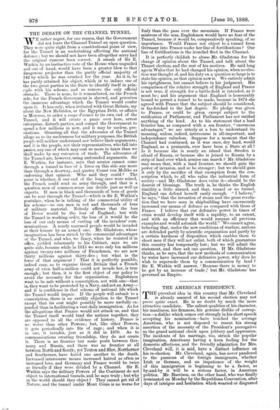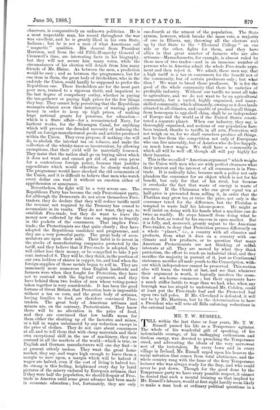THE AMERICAN PRESIDENCY.
T"prevalent idea in this country that Mr. Cleveland is already assured of his second election may not prove quite exact. He is no doubt by much the more attractive candidate. The salient qualities of his Character, his manliness, his firmness, his genuine dislike of corrup- tion—a dislike which comes out strongly in his short speech accepting his nomination—have touched the average American, who is not disposed to resent his strong assertion of the necessity of the President's prerogative as the grand national check upon jobbery and oppression. The incidents of his marriage, too, struck the popular imagination, Americans having a keen feeling for the domestic affections, and the friendly admiration for Mrs. Cleveland will, it is said, have a distinct influence on his re-election. Mr. Cleveland, again, has never pandered to the passions of the foreign immigrants, whether Irish or German, and an impatience of the weight of this immigration is beginning to be a factor, as by-and-by it will be a serious factor, in American politics. Mr. Harrison, on the other hand, who was finally nominated on Monday by the Republican Convention, after days of intrigue and hesitation which wearied or disgusted observers, is comparatively an unknown politician. He is a most respectable man, his record throughout the war was excellent, and he is greatly liked in his own State, Indiana ; but he is not a man of what Americans call " magnetic" qualities. His descent from President Harrison, and from the old Fifth-Monarchy General of Cromwell's time, are interesting facts in his biography, but they will not secure him many votes, while the circumstances of his election will detach from him many friends of Mr. Blaine. As between the men, a prediction would be easy ; and as between the programmes, but for one item in them, the great body of freeholders, who in the end rule the Union, could hardly be supposed to prefer the Republican one. These freeholders are for the most part poor men, trained to a rigorous thrift, and impatient to the last degree of compulsory outlay, whether in paying the tax-gatherer or paying high prices for the few things they buy. They cannot help perceiving that the Republican managers almost avow their intention of wasting public money in order to keep up high prices, of making huge national grants for pensions, for education— which is a State affair—for a reconstructed Navy, for harbour works, for the Nicaragua Canal, for anything which will prevent the dreaded necessity of reducing the tariff on foreign manufactured goods and articles produced within the Union. They even propose, if nothing else will do, to abolish the internal tax on tobacco, and make the collection of the whisky-taxes so inconvenient, by allowing exemptions, that their yield will be materially lessened. They insist that the nation shall go on buying silver which it does not want and cannot get rid of, and even press for a contentious foreign policy, because that justifies expenditure which would otherwise be closely watched. The programme would have shocked the old economists of the Union, and it is difficult to believe that men who watch every dollar can read it without an emotion either of apprehension or annoyance.
Nevertheless, the fight will be a very severe one. The Republican Party has become the only Protectionist party, for although the Democrats do not avow themselves Free- traders, they do declare that they will reduce tariffs until the revenue not required by the Treasury has ceased to accumulate in its vaults. They do not want, they say, to establish Free-trade, but they do want to leave the money now collected by the taxes on imports to fructify in the pockets of the consumers. That implies Free- trade ; the Protectionists see that quite clearly ; they have adopted the Republican candidate and programme, and they are a very powerful party. The great body of accu- mulators are upon their side. Their habit is to invest in the stocks of manufacturing companies protected by the tariff, and they believe that if Free-trade is adopted, they will either lose their money, or be compelled to take 3 per cent. instead of 8. They will be, they think, in the position of our own holders of shares in copper, tin, and lead when the foreign supplies of those metals began to roll in. They are immensely more numerous than English landlords and farmers were when they fought for Protection, they have not to contend with the big-loaf argument, and they have behind them two bodies of men whose voting-power taken together is very considerable, it has been the good fortune of Great Britain that Protection here is impossible without a tax on corn, and the great body of artisans, having families to feed, are therefore convinced Free- traders. The great body of American artisans and miners are, on the contrary, Protectionists. They know there will be no alteration in the price of food, and they are convinced that low tariffs mean for them either the shutting up of the factories and mines, or a fall in wages unbalanced by any reduction except in the price of clothes. They do not care about consumers at all, and to tell them that with cheap materials and their own exceptional skill in the use of machinery, they can contend in all the markets of the world—which is true, as English and German manufacturers will one day find—is at present utterly useless. They want the great home market, they say, and wages high enough to leave them a margin to save upon, a margin which will be halved if wages are halved, even if the cost of living is halved too. So strong is this feeling, heightened every day by lurid pictures of the misery endured by European artisans, that if they were half the population, we should despair of Free- trade in America until some great advance had been made in economic education ; but, fortunately, they are only one-fourth at the utmost of the population. The State system, however, which breaks the mass vote, a majority of one in Illinois, say, throwing all the electors sent up by that State to the "Electoral College" on one side or the other, fights for them, and they have allies in that great number of farmers who are also artisans—Massachussetts, for example, is almost ruled by these men of two trades—and in an immense number of persons who in America admit the whole Free-trade argu- ment and then reject it. We admit, these men say, that a high tariff is a tax on consumers for the benefit not of the community, but of certain producers only ; but what then ? We want to breed those producers. It is for the good of the whole community that there be varieties of profitable industry. Without our tariffs we must all take to agriculture, and we do not want to be an agricultural community, but a, varied, highly organised, and many- skilled community, which ultimately, owning as it does lands situated in all climates, and capable of producing all things, from homespun to egg-shell china, shall be as independent of Europe and the world as if the United States consti- tuted a separate planet. When our industry, they say, is thoroughly organised, and sections of our population have been trained, thanks to tariffs, in all arts, Protection will not weigh on us, for we shall ourselves produce all things, and be free from the competition not only of Europeans who can live miserably, but of Asiatics who do live happily, on much lower wages. We shall have a community in which all will be well off, though all will pay highly for their luxuries.
This is the so-called "American argument" which weighs in the Union with men who see with perfect clearness what their interest and the interest of all consumers is in Free- trade. It is radically false, because such a policy not only plunders the consumer for an object which is not for his benefit, but only for that of his rival, but because it overlooks the fact that waste of energy is waste of resource. If the Chinaman who can grow equal tea at half-price is prevented from selling it, in order that the Floridan may grow tea at twice the price, not only is the consumer taxed for the difference, but the Floridan is tempted to waste half his labour-power. He might as well insist on doing with his hands what a machine can do twice as readily. He stops himself from doing what he can do best, as tested by his success in open market. But it is folly, and, moreover, grossly unjust to the American Free-trader, to deny that Protection presses differently on a whole "planet," i.e., a country with all climates and products, from what it does on a country with one climate and few products, or to question that many American Protectionists are not thinking of selfish interests at all. They are moved by what they think patriotism, the effort to reach an industrial ideal, and they sacrifice the majority in pursuit of it, just as Continental statesmen sacrifice all male youth to the Conscription, with- out which independence cannot be preserved. This section also will learn the truth at last, and see that, whatever their argument is worth, it logically involves the cessa- tion of sea-borne commerce ; but their opponents have a much stiffer battle to wage than we had, who, when any borough was too stupid to understand Mr. Cobden, could at least put the Free-trade loaf and the Protected loaf upon two tall poles. If Mr. Cleveland is defeated, it will not be by Mr. Harrison, but by the determination to have a President who will veto all Bills enforcing reductions in the external tariff.



















































 Previous page
Previous page